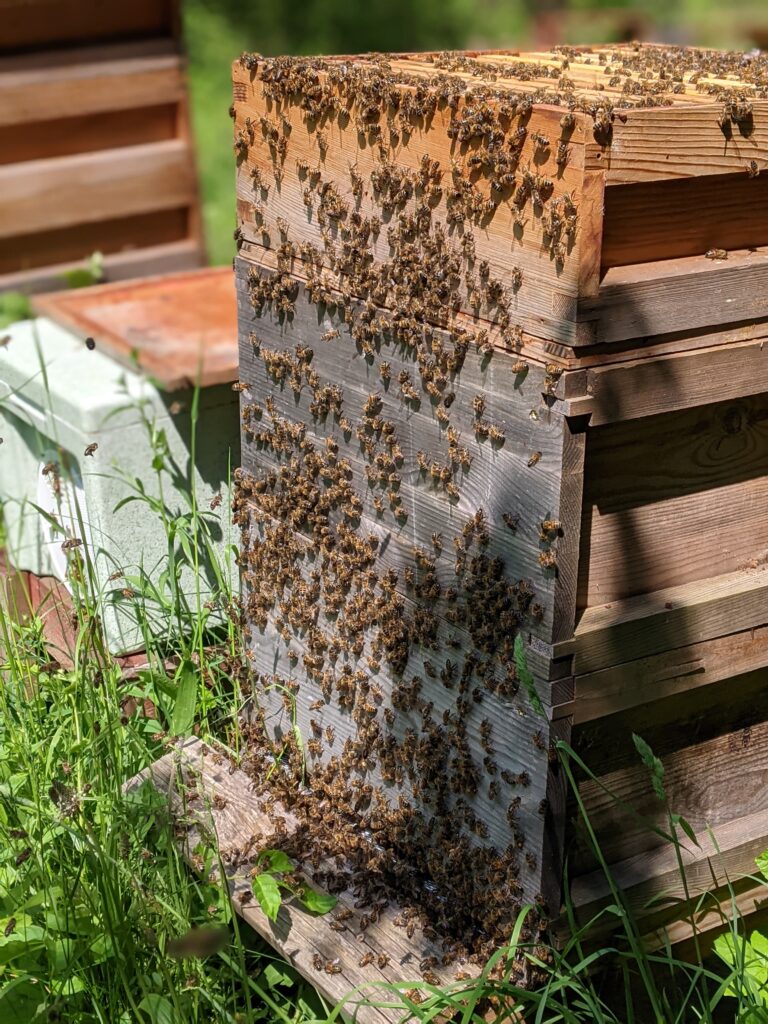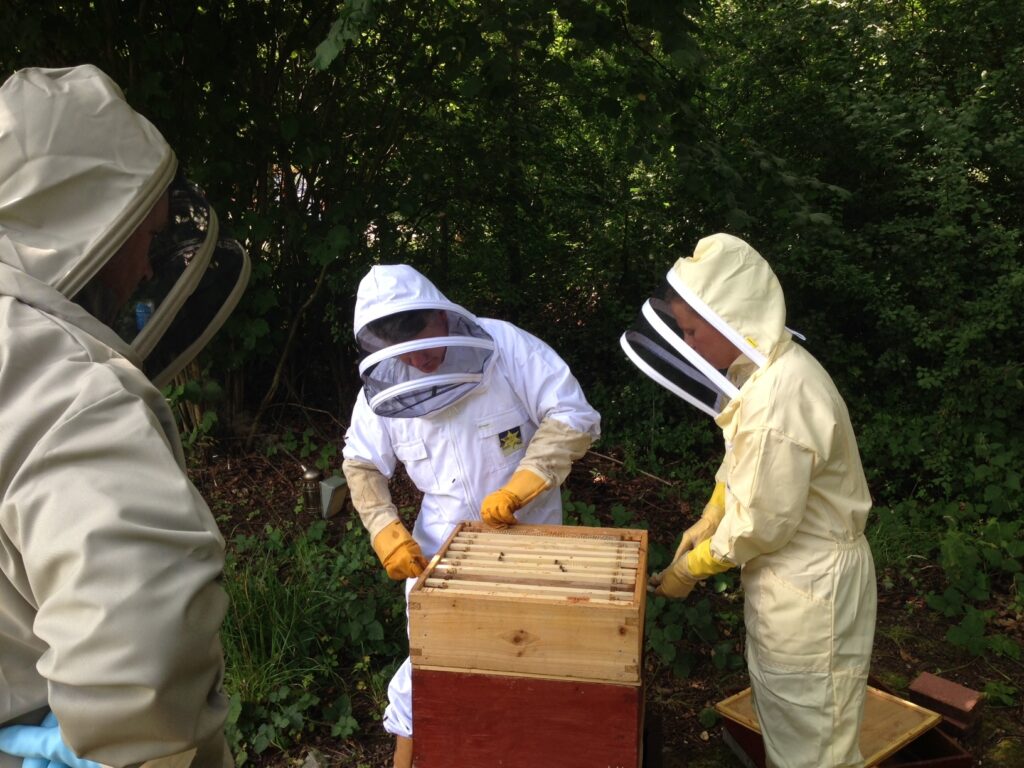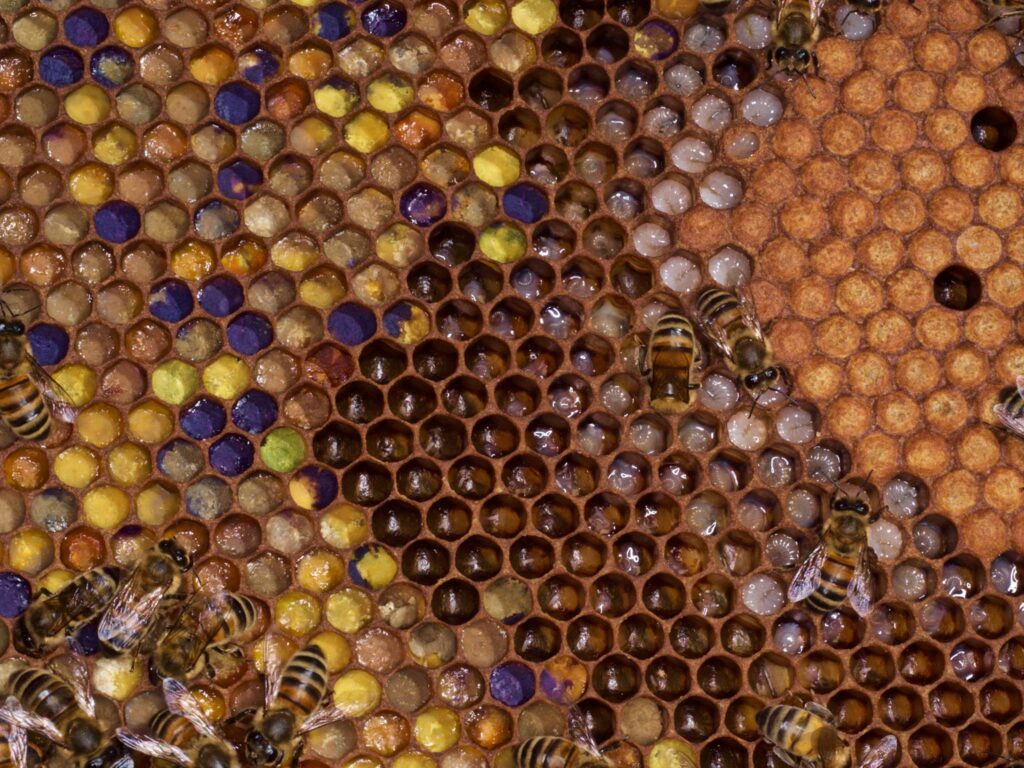World Bee Day: Protecting our Pollinators
Why are we talking about bees?
Honeybees are responsible for pollinating between 5-15% of the UK’s insect-pollinated crops. They, along with other pollinators such as bats and butterflies, are under threat as a result of human activity and the climate emergency.

What is pollination?
This is a fundamental process for our ecosystems and their survival. In simple terms, it’s how flowering plants reproduce. When producing offspring, a plant must be fertilised with pollen to develop seeds that grow into new plants. Pollen is a powdery substance with a usually yellow colour. Flowers produce a sugary substance called nectar to attract pollinators due to its high energy content. Whilst the pollinators feed on the nectar, pollen attaches to their body and is transported with them to other flowers.
Why is pollination so important?
Nearly 90% of the world’s wild flowering plant species rely on animal pollination, not to mention that more than 75% of the world’s food crops and 35% of global agricultural land also depend upon pollination by animals. These figures demonstrate how crucial pollinators are for biodiversity and our worldwide food supply.
How are pollinators under threat?
There isn’t one answer for this. A few of the researched areas are:
Pesticides
The expansion of pesticide use has posed a serious threat to pollinators by exposing them to harmful chemicals and reducing their access to food and habitats. Pesticides are very commonly used within agriculture to keep pests and diseases at bay, but many harm pollinators and other insects.
Climate Change
Changing weather patterns is affecting the regions that are suitable for many species, and along with habitat loss certain species are in decline.
Bees at Loughborough University:
Bees are a welcome inhabitant of the University campus helping to pollinate the fruit, nut trees and edible plants along the foot and cycle paths belonging to our campus Fruit Routes installation.
The University Apiary is currently home to 12 colonies of honeybees. The project is funded by the University Estates and Facilities Management Service, in line with the Biodiversity Action Plan. Our Biodiversity Action Plan, and associated work we do supports the University’s Strategic Theme of Climate Change and Net Zero.

Maintaining the University Apiary helps with the survival of the campus green spaces, by pollinating perennials, trees, bulbs and keeping wider species and habitats healthy. In return, the campus offers year-round forage for the bees.
If enough honey is produced each year, then a harvest is undertaken by the volunteers and a sale of the honey is held through the Creative and Print Online Shop.

In addition to the University Apiary, biodiversity work by the Gardens Team on campus includes planting wildflowers to support all pollinators, including bees, bats, moths, ants, and butterflies, and our development of no-mow areas so that they become wildflower rich in the future.
The primary aim of the apiary is to support the declining bee populations and ensure the health and wellbeing of the bees in our care. The recent European Red List for Bees reports that almost one in ten species of wild bee face extinction.
Oliver Preedy, our Senior Beekeeper, has shared his experience with us:
This is my 7th year of beekeeping. I was fortunate to be able to volunteer at the University apiary and complete a beekeeping course with the Leicestershire and Rutland beekeepers association.
It really is surprising how quickly you zone out the sound of buzzing, which at first can be a bit disconcerting.
I very quickly caught the beekeeping bug and working with a several excellent beekeepers really helped gain practical knowledge. The first time performing an artificial swarm with beekeeping equipment and frames of bees everywhere certainly sticks in my memory, as well as my first honey extraction and seeing the Loughborough gold.
I have really enjoyed being part of the beekeeping team at Loughborough, seeing the bees go from strength to strength and being part of such an inclusive group.
When I started volunteering there were four colonies of bees, these have steadily increased much to the dismay of Jo Shields (who established the apiary) and currently we have 12 colonies all doing well.
Bees are fascinating and I am constantly learning and surprised which I really enjoy. Although it is referred to as beekeeping, really the bees are in charge, we just do our best to support them.
Tips for making your garden pollinator friendly:
- Planting pollinator friendly seasonal plants, lavender is a great summer choice
- Help bats by reducing or removing artificial lighting from your garden and around your property
- Let things grow a little wild in your space
Use the below bee identification sheet to see which you can spot!
You can learn more about pollinators from the Wildlife Trust and claim your ‘Wild Bee Action Pack’ to get your garden buzzing.
Here are 5 simple actions you can do:
Getting involved at Loughborough University:
The Sustainability Team are currently looking for volunteers to help with the management of the bees.
Apiary Supervisors
This role is open to volunteers who have completed one year of volunteering and have undergone formal training. Supervisors will initially support the Apiary Manager, but once they have demonstrated the practical application of the training, they may be required to lead inspections in the absence of the Apiary Manager.
The University will pay for the formal training and annual bee registration will also be funded if the volunteer only works with the campus bees. Apiary Supervisors are expected to support a minimum of two inspections per month during the peak season, from May to October.
Apiary Volunteers
This role is open to anyone who would like to support the trained supervisors and managers. Ideally, volunteers will attend two inspections per month during the peak season which take roughly two hours, but this is voluntary.
All volunteers will have access to University PPE free of charge. Volunteers are rewarded with honey from that extracted at the end of the season proportionate to the support contributed and the volume of honey harvested.
If you would like to learn more about volunteering at the University Apiary, please email environment@lboro.ac.uk.

This article is in support of the United Nations Sustainable Development Goal 15: Life on Land. To read more click here.
Sustainably Speaking
Loughborough University Sustainability Blog